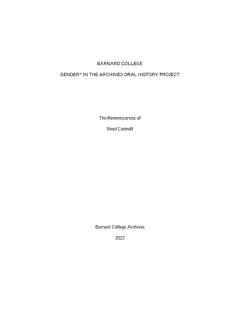Gender* in the Archives
-
This collection includes the audio recordings and transcriptions of four interviews, transcripts of four written interviews, one digital and two physical copies of the zine made in conjunction with this project, a methodological introduction featured in Movement Lab installation, and a Diversity, Equity, and Inclusion (DEI) recommendations document. All materials are in English. It was donated by Carson Stachura and Adam Johnson in 2022 after the event was held in the Milstein Center on Barnard’s campus from October 3-7, 2022.
Carson Stachura (they/them, class of 2023) and Adam Johnson (they/them, class of 2025) collaboratively created this project as part of a Barnard Diversity, Equity, and Inclusion (DEI) Council funded 2022 summer research fellowship in the Barnard Archives.
The project involved collecting oral histories and written responses from trans and nonbinary Barnard students and recent graduates. Interview topics ranged from navigating the College as a queer and/or lesbian student, organizing on campus, feelings of community, and experiencing queer joy at Barnard.
Stachura and Johnson then used this material to create an installation in the Movement Lab of the Milstein Center; they wanted to ensure that this project included a physical space for the convergence of Barnard’s trans/nonbinary community. Additionally, they produced a zine which further details their critique of Barnard’s exclusionary admissions policy as it relates to policing the gender of trans and nonbinary students. They position this project as an archival intervention in accurately documenting trans histories and experiences at Barnard.
As they write in the zine, this exhibition is “a multimedia installation that centers trans voices with a goal of highlighting identity, community, endurance, and joy. As we have collected accounts from a handful of alumni and current students, we also acknowledge the weight of the past, present, and future of queer and trans experiences at Barnard that have evaded the archives and will continue to do so. The nuances of this archival absence can be found by way of executioner and intent. The choice to withhold one’s narrative from documentation at Barnard as an act of refusal differs immeasurably from Barnard acting to exclude trans stories.”
Stachura and Johnson explicitly undertook this project to fill the archival silences and gaps regarding trans students at Barnard and the lack of nuanced representation in the College’s Archives. This collection seeks to disrupt the violence of improper archival representation and actively works to ensure trans people are able to engage with transnesses in a celebratory way within Barnard’s archives.








